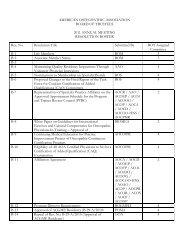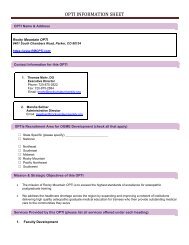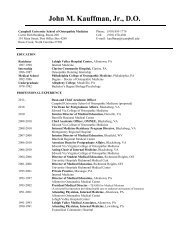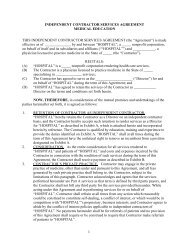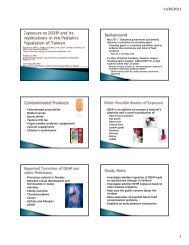Dialogue and Diagnosis - American Osteopathic Association
Dialogue and Diagnosis - American Osteopathic Association
Dialogue and Diagnosis - American Osteopathic Association
You also want an ePaper? Increase the reach of your titles
YUMPU automatically turns print PDFs into web optimized ePapers that Google loves.
missed <strong>and</strong> the next scheduled dose<br />
is less than 3 days from the current<br />
time, the patient should wait until<br />
the next regularly scheduled dose to<br />
restart the medication. 44<br />
Are there oral forms<br />
of GLP-1 receptor<br />
agonists?<br />
Many patients are aware that several<br />
new drugs are available to manage<br />
the hyperglycemia of T2DM. Represented<br />
prominently in the AACE<br />
treatment algorithm 9 are DPP-4<br />
inhibitors, primarily because of their<br />
good tolerability <strong>and</strong> low risk of<br />
hypoglycemia. However, important<br />
differences exist between that class<br />
of incretin-based medications <strong>and</strong><br />
GLP-1 receptor agonists. The DPP-4<br />
inhibitors work to inhibit the enzyme<br />
that degrades GLP-1. Although DPP-4<br />
inhibitors may inhibit the degrada -<br />
tion of GLP-1, many patients with<br />
T2DM have an impaired incretin<br />
effect, so ambient GLP-1 levels may<br />
already be compromised in these<br />
individuals. 49 This compromised<br />
condition may partly explain the difference<br />
in glucose-lowering potential<br />
between DPP-4 inhibitors <strong>and</strong> GLP-1<br />
receptor agonists, in favor of GLP-1<br />
receptor agonists, 29,50,51 which<br />
directly provide GLP-1 agonism at<br />
pharmacologic or supraphysiologic<br />
levels. 52 The DPP-4 inhibitors primarily<br />
affect postpr<strong>and</strong>ial glucose<br />
levels. 53<br />
The differences in effects on GLP-1<br />
levels may partly explain the<br />
differences in weight effects between<br />
GLP-1 receptor agonists <strong>and</strong> DPP-4<br />
inhibitors. 29,33 Recent data suggest<br />
that a reduced incretin effect <strong>and</strong><br />
fasting hyperglucagonemia may constitute<br />
early steps in the pathophysiologic<br />
development of T2DM,<br />
detectable even in obese people who,<br />
despite their insulin-resistant state,<br />
have normal glucose tolerance. 54<br />
References<br />
1. Inzucchi SE, Bergenstal RM, Buse JB, et al.<br />
Management of hyperglycemia in type 2<br />
diabetes: a patient-centered approach—position<br />
statement of the <strong>American</strong> Diabetes <strong>Association</strong><br />
(ADA) <strong>and</strong> the European <strong>Association</strong> for the<br />
Study of Diabetes (EASD) [published online<br />
ahead of print April 19, 2012]. Diabetes Care.<br />
2012;35(6):1364-1379.<br />
2. Lamanna C, Monami M, Marchionni N,<br />
Mannucci E. Effect of metformin on<br />
cardiovascular events <strong>and</strong> mortality: a metaanalysis<br />
of r<strong>and</strong>omized clinical trials. Diabetes<br />
Obes Metab. 2011;13(3):221-228. doi:<br />
10.1111/j.1463-1326.2010.01349.x.<br />
3. Decensi A, Puntoni M, Goodwin P, et al.<br />
Metformin <strong>and</strong> cancer risk in diabetic patients: a<br />
systematic review <strong>and</strong> meta-analysis [published<br />
online ahead of print October 12, 2010]. Cancer<br />
Prev Res (Phila). 2010;3(11):1451-1461.<br />
4. Nathan DM. Finding new treatments for<br />
diabetes—how many, how fast... how good? N<br />
Engl J Med. 2007;356(5):437-440.<br />
5. H<strong>and</strong>elsman Y, Mechanick JI, Blonde L, et al;<br />
AACE Task Force for Developing Diabetes<br />
Comprehensive Care Plan. <strong>American</strong> <strong>Association</strong><br />
of Clinical Endocrinologists Medical Guidelines<br />
for Clinical Practice for developing a diabetes<br />
mellitus comprehensive care plan. Endocr Pract.<br />
2011;17(suppl 2):1-53.<br />
6. <strong>American</strong> Diabetes <strong>Association</strong>. St<strong>and</strong>ards of<br />
medical care in diabetes—2012. Diabetes Care.<br />
2012;35(suppl 1):S11-S63.<br />
7. Wadden TA, Neiberg RH, Wing RR, et al; Look<br />
AHEAD Research Group. Four-year weight losses<br />
in the Look AHEAD study: factors associated with<br />
long-term success [published online ahead of<br />
print July 21, 2011]. Obesity (Silver Spring).<br />
2011;19(10):1987-1998.<br />
doi:10.1038/oby.2011.230.<br />
8. Kumar AA, Palamaner Subash Shantha G,<br />
Kahan S, Samson RJ, Boddu ND, Cheskin LJ.<br />
Intentional weight loss <strong>and</strong> dose reductions of<br />
anti-diabetic medications—a retrospective<br />
cohort study. PLoS One. 2012;7(2):e32395.<br />
9. Rodbard HW, Jellinger PS, Davidson JA, et al.<br />
Statement by an <strong>American</strong> <strong>Association</strong> of Clinical<br />
Endocrinologists/<strong>American</strong> College of<br />
Endocrinology consensus panel on type 2<br />
diabetes mellitus: an algorithm for glycemic<br />
control. Endocr Pract. 2009;15(6):540-559.<br />
10. Cryer PE. The barrier of hypoglycemia in<br />
diabetes. Diabetes. 2008;57(12):3169-3176.<br />
11. Cryer PE. Hypoglycemia: still the limiting<br />
factor in the glycemic management of diabetes.<br />
Endocr Pract. 2008;14(6):750-756.<br />
12. Cryer PE, Axelrod L, Grossman AB, et al;<br />
Endocrine Society. Evaluation <strong>and</strong> management<br />
of adult hypoglycemic disorders: an Endocrine<br />
Society Clinical Practice Guideline [published<br />
online ahead of print December 16, 2008]. J Clin<br />
Endocrinol Metab. 2009;94(3):709-728.<br />
13. Amiel SA, Dixon T, Mann R, Jameson K.<br />
Hypoglycaemia in type 2 diabetes [published<br />
online ahead of print January 21, 2008]. Diabet<br />
Med. 2008;25(3):245-254.<br />
14. Pettersson B, Rosenqvist U, Deleskog A,<br />
Journath G, W<strong>and</strong>ell P. Self-reported experience<br />
of hypoglycemia among adults with type 2<br />
diabetes mellitus (Exhype) [published online<br />
ahead of print December 30, 2010]. Diabetes Res<br />
Clin Pract. 2011;92(1):19-25.<br />
15. Sutton L, Chapman-Novakofski K.<br />
Hypoglycemia education needs [published<br />
online ahead of print March 10, 2011]. Qual<br />
Health Res. 2011;21(9):1220-1228.<br />
16. Kahn SE, Lachin JM, Zinman B, et al; ADOPT<br />
Study Group. Effects of rosiglitazone, glyburide,<br />
<strong>and</strong> metformin on ?-cell function <strong>and</strong> insulin<br />
sensitivity in ADOPT [published online ahead of<br />
print March 17, 2011]. Diabetes.<br />
2011;60(5):1552-1560.<br />
17. Jellinger PS, Lebovitz HE, Davidson JA;<br />
ACE/AACE Outpatient Glycemic Control<br />
Implementation Task Force. Management of<br />
hyperglycemia in type 2 diabetes: a consensus<br />
algorithm for the initiation <strong>and</strong> adjustment of<br />
therapy: a consensus statement from the<br />
<strong>American</strong> Diabetes <strong>Association</strong> <strong>and</strong> the<br />
European <strong>Association</strong> for the Study of Diabetes:<br />
response to Nathan et al. Diabetes Care.<br />
2007;30(4):e16-17.<br />
18. Liraglutide [package insert]. Princeton, NJ:<br />
Novo Nordisk Inc; January 2010. http://www<br />
.accessdata.fda.gov/drugsatfda_docs/label/2010/<br />
022341lbl.pdf. Accessed June 26, 2012.<br />
19. Tolman KG. The safety of thiazolidinediones<br />
[published online ahead of print March 3, 2011].<br />
Expert Opin Drug Saf. 2011;10(3):419-428.<br />
20. Kahn SE, Zinman B, Lachin JM, et al; for the<br />
A Diabetes Outcome Progression Trial (ADOPT)<br />
Study Group. Rosiglitazone-associated fractures<br />
in type 2 diabetes: an analysis from A Diabetes<br />
Outcome Progression Trial (ADOPT) [published<br />
online ahead of print January 25, 2008].<br />
Diabetes Care. 2008;31(5):845-851.<br />
21. Piccinni C, Motola D, Marchesini G, Poluzzi<br />
E. Assessing the association of pioglitazone use<br />
<strong>and</strong> bladder cancer through drug adverse event<br />
reporting [published online ahead of print April<br />
22, 2011]. Diabetes Care. 2011;34(6):1369-<br />
1371.<br />
22. Blonde L. Improving care for patients with<br />
type 2 diabetes: applying management<br />
guidelines <strong>and</strong> algorithms, <strong>and</strong> a review of new<br />
evidence for incretin agents <strong>and</strong> lifestyle<br />
intervention. Am J Manag Care. 2011;17(suppl<br />
14):S368-S376.<br />
23. Fonseca VA. Incretin-based therapies in<br />
complex patients: practical implications <strong>and</strong><br />
opportunities for maximizing clinical outcomes:<br />
a discussion with Dr. Vivian A. Fonseca. Am J<br />
Med. 2011;124(1 suppl):S54-S61.<br />
24. Buse JB, Klonoff DC, Nielsen LL, et al.<br />
Metabolic effects of two years of exenatide<br />
treatment on diabetes, obesity, <strong>and</strong> hepatic<br />
biomarkers in patients with type 2 diabetes:<br />
an interim analysis of data from the open-label,<br />
uncontrolled extension of three double-blind,<br />
placebo-controlled trials. Clin Ther.<br />
2007;29(1):139-153.<br />
25. Astrup A, Carraro R, Finer N, et al. Safety,<br />
tolerability <strong>and</strong> sustained weight loss over 2<br />
years with the once-daily human GLP-1 analog,<br />
liraglutide [published online ahead of print<br />
August 16, 2011]. Int J Obes (Lond).<br />
2012;36(6):843-854. doi: 10.1038/ijo.2011.158.<br />
<strong>Dialogue</strong> <strong>and</strong> <strong>Diagnosis</strong> // September 2012<br />
21



